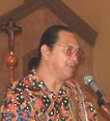To incur the ire of
powers-that-be just makes the work harder but not any less inviting.
Advocacy is true rebellion,while most of those we call rebellions
are
mere reactions to unendurable pain and suffering. Advocacy is first and
foremost a choice of priority values, usually the highest and
finest
in each field of interest. That is why many advocates often stumble not
much differently from like their counterparts in the political or big
business sectors.
Advocacies have visions
and are driven by them. These visions and their loftiness raise the
activity of advocates beyond the pendulum of routine cycles, the
patterned swings from left to right, from right to left. Advocacies,
after all, attempt to elevate the standards by which human minds
understand, by which human emotions feel, and by which human action
comports itself.
Thus, many advocates
carrying a variety of crusades prepare the way of
the future. They
hack at the chains which limit human creativity, demystify
the taboos
that constrict human freedom. And they try at all times to present
glimpses of realities which are not yet but can be if only fear and
failure
give way to innovation and adventure. Irony is not a strange
bedfellow of
advocates. The many twists and turns of life are most
present among the rebels of society. Those who start as objects of
ridicule or condemnation
often become heroes honored with statues and
titles when the rebellion
succeeds, or when a revolutionary idea is
proven to be effective and beneficial
to society.
Irony can also work the
opposite way. Revolutions sometimes are not kind to those who sired them
once success makes conservatives of rebels and evolves a new elite. In
the Philippine landscape, successful revolutions at
EDSA have given
impetus to the propagation of traitors, aptly called balimbings
in
our political dictionary. And the balimbings by far benefit more than
advocates who squirm at compromise. It was civil society who led the
call
for a change when the odds were nil for success. Arithmetic is
not the strong suit of advocates, and the utter lack of congressmen who
would go for
a presidential impeachment before the famous Chavit
Singson expose did
not bother groups who simply could not turn their
backs on their convictions.
Estrada must have seemed like a cancer
that had to be excised even if the odds for survival were low, or
zero.
And so the struggle for
change began with small and quiet meetings between individuals and
groups who gravitated to the same sensibilities, inspired by the same
ideals. Sometimes they met in the Ateneo, sometimes in the parish halls,
and oftentimes in the resident of Senator Teofisto Guingona. The Davids
of change counted the odds, arrived at the right answer – that they had
no chance – and then said “sige lang, basta,” or “never mind,
whatever.”
C O PA was not that
convinced about the early impeachment gambit. In fact, it was alarmed
because of it. In a meeting held sometime mid-2000, C O PA Secretary
General Pastor T. Saycon arranged a discussion between a few leaders of
the most determined impeachment initiators and key officers of the
People’s Patriotic Movement. The purpose of the meeting was to
dissuade
pro-impeachment groups from starting something without a
more comprehensive plan on “what after” scenarios. It was already the
conclusion of key COPA officers that the situation was deteriorating
fast for Estrada and that the move to impeach him could be the trigger
for civil unrest and eventual military intervention.
But reason, too, like
arithmetic, is not a guaranteed deterrent for seemingly
Quixotic
crusades of advocates, and the move to impeach Estrada would continue to
be undertaken without letup. This same passion does not allow
rationalizations from the glibbest mouths of Estrada strategists and
propagandists or administration apologists to cloud the convictions and
values of the civil society groups most involved in igniting EDSA
II.
What is admirable,
though, and also evidence that this nation will move forward guided by
noble values and patriotic visions is the great increase of advocates
from civil society. In the past, patriotism seemed to be the exclusive
domain of statesmen and rebels, the two extremes of the political
spectrum. Today, thousands can actually bring themselves to march either
in protest or to promote a program, with each articulate enough to
explain the purpose of their action. In other words, hindi hakot (not a
paid crowd).
These thousands are
spread all throughout the nation as the angst for principled politics
and the return of noble and traditional values become a palpable demand
of a despairing society. They are no match for the numbers
that the
failed EDSA Tres leaders managed to bring to the EDSAShrine, but they
are the thousands who just won’t quit and who will extend their
influence to others every day in every way. They are thousands of
missionaries,
dedicated and determined. They are the patriots who
will go beyond compromise to establish a new nation.
It is these advocates
who are particularly averse to sleeping with the
enemy, and are
filled with concern when they think that their installed administration
intends to do so. It is not really a matter of choice on their part,
just as a body simply retches at the stench of foul odor. It has nothing
to do with liking or disliking the political leadership but of being
unable to tolerate swimming with snakes. And sleeping with the enemy is
not the worst thing that can happen. It is allowing their sperm of
values to gestate in our wombs.
No wonder, then, that
advocates walk a lonely path, driven only by passionate visions of a
free Philippines and strong Philippines, grounded in spirituality and
patriotism, finally rid of trapos and carpetbaggers.
- end of
article -

